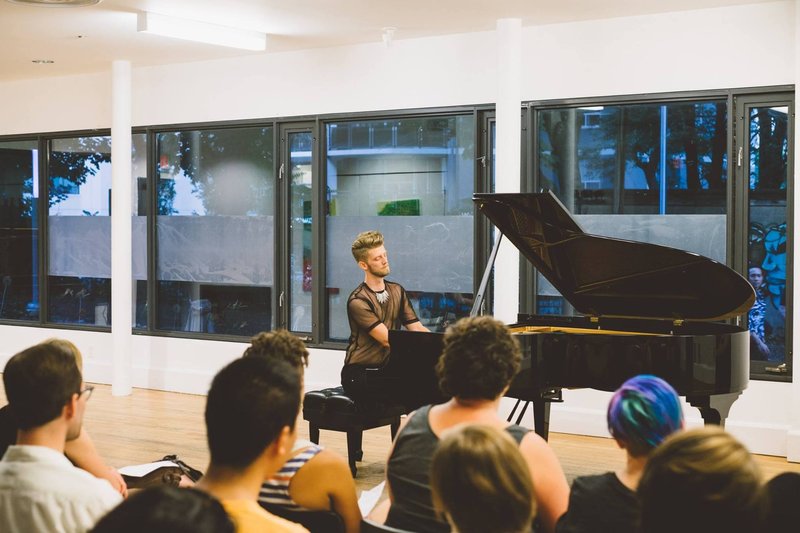Asking for help scares people. And the perception issues surrounding classical-music culture can make asking an even more unnerving prospect for musicians.
In a cut-throat world where freelancers must fight for every scrap to break into the gig scene, and appearances are everything – a world more imagination than reality – classical musicians often balk at the idea of asking for money online, or even busking on streets and in subways, lest the illusion be destroyed that their gifts were so prodigious that success comes easy.
Pianist Darren Creech has no such illusions. He is the latest subject of National Sawdust Log’s You Should Be Following series, which takes a deeper look at classical musicians both rising and established who’ve pursued unconventional career paths. Carving a niche as the only queer classical pianist to fiercely highlight his identity on stage, Creech has an entrepreneurial savvy that has landed him university keynote concerts, coveted festival performances and awards, and a fateful slide into his DMs by none other than esteemed piano maker Steinway.
(Hold this thought.)

Despite searching through dozens of pages, Darren Creech was at a loss.
“I couldn’t find a single queer pianist on Google.”
Naturally, Creech felt a calling to fill that void. “It was frustrating as a queer artist to not see myself represented in the classical music industry,” Creech, 27, said in a recent interview with National Sawdust Log. “Though there are ‘out’ performers, it generally feels like more of a side note than integral to their work.”
Creech, by contrast, has chosen to center his queer identity in his work very boldly, whether in places like his professional bio (“An innovative artist, queer classical pianist Darren Creech…”) or his Instagram handle, @queerpianist. His performances evoke a classical recital, but with the flair of a cabaret show, with frequent costume changes (a lot of glitter is involved) during which the silence is filled with spoken word, written and pre-recorded by Creech.
“Just by seeing a grand piano in a room, audiences already walk in with a certain expectation of what they are about to experience. I deeply enjoy playing with that in an unspoken way, getting audiences to ask themselves challenging questions: ‘Am I uncomfortable with seeing this performer in glitter shorts and a crop top? Why is that?’” The results, combined with inventive staging and lighting, are intended to lead the audience on a journey much more narrative-based than traditional concerts or recitals.
Now, Creech is building his career from the ground up; he moved to Toronto a year ago with no savings, no practice space, and just a few professional contacts, eventually making it work through an uncanny resourcefulness that dates back to his adolescence. Born in Canada and raised in Senegal, Creech learned early on how to hustle to get “butts in seats.” As one of only two trained pianists in the region—the other was his teacher—Creech often put on solo concerts by himself. In the process, he learned many crucial skills that many conservatory diploma holders still lack.
“I did all the administrative work behind the concert as well, from promotion to printing programs,” Creech recalls. “In this way, studying music outside of a competition circuit really helped me frame the experience in the context of community-building. At the time, I didn’t have the technical background of many of my peers. But I had done a lot of the emotional work around why I wanted to play music, which I think served me very well in the long-run.”
That sense of purpose behind Creech’s concert experiences has netted him several opportunities. He was named Best Artist at Nuit Rose, Toronto’s annual queer performance festival. He gave the globally live-streamed keynote speech and performance to McGill University’s Graduate Music Symposium – a spot almost universally given to professors, which Creech is not – recently completed a tenure as resident artist at the Banff Centre, and has given numerous talks and masterclasses across Canada on both his artistic practice and entrepreneurship.
But behind these glamorous milestones were in part, as Creech puts it, “a mix of dumb luck, sheer desperation, and supportive colleagues.”
Indeed, his McGill keynote was spawned by suggesting himself – “half-jokingly, half not” – when a friend asked for speaker recommendations. And that Steinway DM? Creech discovered that his only option for his Nuit Rose performance was a borderline unusable upright piano. Having exhausted all possibilities, Creech turned to Facebook to crowdsource his friends for options… and tagged Steinway’s Facebook page. As Creech detailed in a subsequent GoFundMe campaign, Steinway’s Ontario-regional manager messaged him personally to offer a sponsorship of the concert, waiving the steep four-figure rental fees. (The campaign, successfully executed by Creech, covered Steinway’s cartage fee.)
“I’ve trained myself to ask for a lot of things, even if it feels way beyond my depth,” Creech says, “because I believe that even if I’m not ‘qualified’ or ‘experienced’ enough to do something or receive something, I could succeed with it.”
Those who have read musician Amanda Palmer’s memoir The Art of Asking might sense echoes of her outlook in Creech: namely, the persistent belief in human generosity as the fuel for big dreams.
Palmer, another high profile musician who has given TED talks on asking for help, once held the record for most funded music album in Kickstarter history, famously raising $1.2 million on the crowdfunding website. Creech’s savvy crowdfunding hasn’t scaled those heights (yet), but the musician has raised over $2,000 online in two initiatives, funding not only the Steinway piano cartage costs, but also festival expenses for his Banff residency.

Creech’s “art of asking” has yielded more than just cash, of course. Sometimes, he found that a big ask yielded not what he asked for, but instead something much more useful.
In attempting to fund the piano cartage for the Nuit Rose affair, and having known a few contacts at the Canadian Broadcasting Company from entering their Piano Hero competition in years past, Creech wrote an email out of desperation, asking if the CBC would sponsor the funds for the piano.
“They said, ‘We don’t give money to people, but we’ll write an article about you!’ I was floored. I was a finalist in their competition twice and lost both times. It was a big lesson in learning that you can always spin supposed failures into new things.” (You can read the article here.)
Now, Creech is working on crafting a new concert experience called CLARITY. “I want to explore the moments of clarity that we have throughout our life,” he explains, “understanding that slow changes happen over time, and discovering the moments where those changes become realizations. I find it interesting to think about what contributes to those moments happening, and creating a musical experience around those feelings.”
Asked what helps him create such immersive experiences, Creech cites experiences outside the concert hall. “Ultimately, I want to be telling a specific story of my own experience that can resonate with anyone. A lot of my inspiration comes from attending non-classical events and concerts. I try to understand what it was about those experiences that I connected with, and what the public at large connected with.”
Looking outside music school’s bubble became a prerequisite early on as Creech pursued his dreams. “It was always a battle to bring my queerness to the stage in recitals. I had very specific ideas about what I wanted to get out of my performance degree, and often I had to stand as the sole advocate for my art.” After this resistance in the conservatory environment, Creech has a number of changes he’d make to the existing educational apparatus of music schools—competitions in particular.
“In school, competitions are often built to answer the question: Who’s the best pianist in the studio? That’s, to me, a false representation of the skill set needed to succeed as a classical musician today. Obviously, your playing matters. But if you’re a nice person, if you’re doing interesting work, and if people know who you are—those are the things that define your career, especially in the early to mid stages.
“Thankfully, I think music schools are starting to understand that innovation and entrepreneurship are necessary skills, and devoting time to teach them in the process. It’s funny: after fighting those battles, I ended up being the first graduate of my class invited back to give a master class and talk about my journey.”
At talks like these, Creech offers practical advice for aspiring musicians trying to make it in an unforgiving freelance universe. The tip that stands out is building a strong network: keeping in touch with colleagues and their work via phone calls, leaving supportive Facebook comments, and attending their performances in person. But undergirding those actions, he says, must be a genuine caring about the person.
“Without actually caring, comments and phone calls become this transactional, gross networking shit,” he says. “But if you’re genuinely excited about what someone else is doing, it’s both easy and fulfilling to show up for them.”
Doesn’t that get tiring to a person who works as hard as Creech does? He agrees—but not in the way that you’d think. “Because creating and performing can be so exhausting and draining, it means so much to me to feel the support from people who are behind the work that I do. I want to give that feeling to others, too.”
Darren Creech can be found on Facebook and Instagram (@queerpianist).
John Hong, a trained clarinetist warmly reviewed as a “deft solo player” by the Chicago Tribune and praised for performing “with aplomb” by The New York Times, is a lifelong devotee of amplifying the narratives behind classical music, whether in print or through performance. Hong has performed for Lincoln Center’s Mostly Mozart festival and the American Ballet Theatre, and appears in both audio and video during the fourth season of the Emmy-winning TV show Mozart in the Jungle. He serves as Copywriter for National Sawdust, conceived and co-writes the weekly National Sawdust Log newsletter, and holds a Master of Music diploma from The Juilliard School.